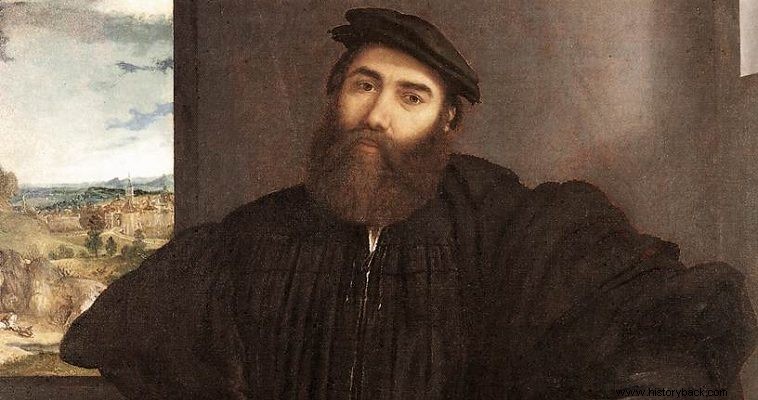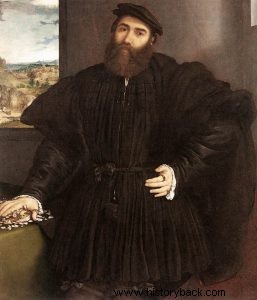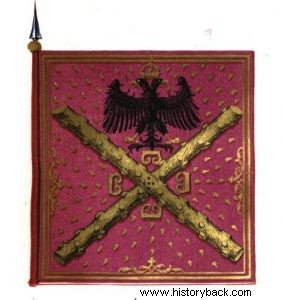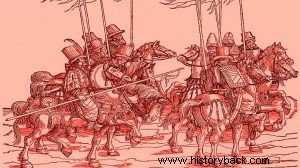
Mercurios Boas was the son of Theodoros Boas, an official at the court of the Despots of Mystras. He came from a great Byzantine military family from Angelokastro. His year of birth is not known.
Mercury Boas is indeed a special case. You are rightly considered the leader of the famous Soldiers. He came from Epirus, from Angelokastro. In the 14th century his family was persecuted by the Turks and fled first to the mountainous Evrytania and then to the Peloponnese.
All his ancestors were Soldiers, chief among them Theodore, the comrade-in-arms of Claudius the Crocodile, Peter, who served in Italy, and Thomas, who became a colonel in the English army and commander of the light cavalry of Henry VIII of England.
But no one surpassed the fame of Mercurius, who fought on behalf of the Venetians, the German emperor Maximilian, and the French king Louis XII, who in fact for his services anointed him a count and granted him lands and money.
Curiously, Mercurius had been anointed a count (of Swabia) by the German emperor Maximilian. Fortunately, Boas, who was also called Grivas, because of the color of his horse, as well as his protopalikaro, Ioannis (Zanes) Koronaios, were lovers of ancient Greek history and the Iliad.
So Koroneios decided to write down his captain's exploits in metered speech, in a long poem with the title "Mercury's Anthragathima". This is how important information about the actions of most of the Greek Soldiers has reached our days.
Mercurius fought with his body in all the important battles of the first phase of the Italian Wars (1495 -1512). But his greatest victory and the most detailed was the one in Genoa in 1507.
In 1507, the French king Louis besieged the Italian city of Genoa, an important port, but also a crossing point from France to Italy. The forces of the French king numbered about 50,000 men, many of whom were auxiliaries.
2,000 Soldiers and Argouletes fought with him, under Mercurius Buas. The Genoese, reinforced with other Italian divisions, put up a strong defense, having fortified positions far from the walls of their city, around them, taking advantage of the terrain.
On a low hill the Genoese had built a strong bastion, reinforced with cannons, from where they decimated the French and forbade them to think of advancing any closer to the city.
The bastion had to be captured. The French king had previously ordered his forces to occupy it. But all the French raids failed with heavy losses. Louis then summoned Mercurius and, according to his biographer, said to him:
"You, Mr. Mercury, come out of the cave to fight a war, and we will fight another." However, the measured words of Koronaios are also confirmed by the French historian and eyewitness, d'Auton, who reports:"The king called Mercurion and said to him:
"Ride with all the lower Soldiers and begin a light shelling towards the body of the enemy, which is located closest to the bastion. Behind the mountain you set up an ambush of more men, footmen and horsemen, as if you needed help. After the acrobolism you want to feign retreat as you drag the enemies up to the watery ambush, and there give them a good salute. At the same time, I will order several foot soldiers and heavy horsemen to go up the mountain, to support the two men from above and let's start the battle".
Then Mercury took with him 100 Soldiers and began to ascend the hill. Mercurius placed several of his men in ambush and with the rest set out for the bastion. At the same time 3,000 Swiss and 6,000 French infantry began to climb the ridge, followed by the heavy cavalry. At the same time the Greeks had arrived in front of the bastion and had begun the acrobolism with the Genoese.
The Genoese greeted the Soldiers with a shower of arrows and missiles. The Soldiers responded with arquebuses and crossbows, but moving constantly, so as not to give a target. Everyone then believed that Mercury and his men would surely perish. The king's Swiss bodyguards even fell face down on the ground and prayed for the salvation of the Greeks.
And it seems that their prayers were answered, since the Greeks not only survived all but one, but also killed six Genoese. However, they still had to hold out until the army's bulk reached its peak. Finally when Mercurius saw the infantry coming up, he ordered his men to retreat, as "panicked" as possible.
In this phase two other men were wounded. The Genoese, having focused their attention on the insolent Soldiers, did not notice the many enemies coming from a covered route. In fact, enraged by the losses they had suffered from the Greeks, many of them left their positions and rushed at them with the yacht "accarne" (in the cold!).
But suddenly they found themselves in front of a surprise. In a clearing they saw with horror two cannons in front of them, pointing menacingly at them. Before they could react two explosions rang out and the chainsaws loaded with chainsaws fired their deadly charge at them, mowing them down. Before they could recover, the rest of the Soldiers and French infantry rushed in front of them and killed him.
A second Genoese division following, fled without a fight. His men were throwing their weapons and breastplates at him, trying to escape the pursuit of the Soldiers. The Swiss meanwhile occupied the bastion. The battle was won thanks to the Soldiers. The total losses of the French army, in dead, reached 39 men. The Genoese, on the contrary, left behind 1,400 dead.
During the same siege Mercurius and his Soldiers performed an even greater feat. Alone, this time, they moved by night, through a mountain, and at the first light of the following day they fell upon the unsuspecting Genoese.
This is how I. Koroneios describes the event:"They went out from there and walked all night, and their horses trod on the mountains barefooted, he took the army and the barefooted one on foot, and as the sun rose he entered the enemies. He found them arrayed (without order) on that side, because they could not be trusted to receive a stake, on that side, because it was not attacked by horse, nor man, nor was it on foot. Two thousand cutlass and a thousand they received, and five hundred gentle lords they enslaved. Then the king, seeing great joy, threw his hands around Mercury's neck. And on both cheeks give him a glicophile, give him a lot of praise in the camp".
Mercurius fought for the last time at the Battle of Pavia in 1525. He died in Italy in 1560, where he was buried.

Mercury Boas.

The flag of Mercury Bois, with the double-headed eagle, the four B's of the Paleologues and the cross of Saint Andrew.

Light cavalry soldiers.
